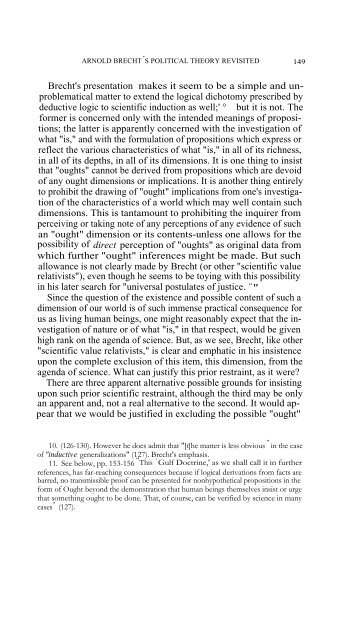ARNOLD BRECHT'S POLITICAL THEORY REVISITED Political ...
ARNOLD BRECHT'S POLITICAL THEORY REVISITED Political ...
ARNOLD BRECHT'S POLITICAL THEORY REVISITED Political ...
You also want an ePaper? Increase the reach of your titles
YUMPU automatically turns print PDFs into web optimized ePapers that Google loves.
<strong>ARNOLD</strong> BRECHT ' S <strong>POLITICAL</strong> <strong>THEORY</strong> <strong>REVISITED</strong> 149<br />
Brecht's presentation makes it seem to be a simple and unproblematical<br />
matter to extend the logical dichotomy prescribed by<br />
deductive logic to scientific induction as well;' ° but it is not. The<br />
former is concerned only with the intended meanings of propositions;<br />
the latter is apparently concerned with the investigation of<br />
what "is," and with the formulation of propositions which express or<br />
reflect the various characteristics of what "is," in all of its richness,<br />
in all of its depths, in all of its dimensions. It is one thing to insist<br />
that "oughts" cannot be derived from propositions which are devoid<br />
of any ought dimensions or implications. It is another thing entirely<br />
to prohibit the drawing of "ought" implications from one's investigation<br />
of the characteristics of a world which may well contain such<br />
dimensions. This is tantamount to prohibiting the inquirer from<br />
perceiving or taking note of any perceptions of any evidence of such<br />
an "ought" dimension or its contents-unless one allows for the<br />
possibility of direct perception of "oughts" as original data from<br />
which further "ought" inferences might be made. But such<br />
allowance is not clearly made by Brecht (or other "scientific value<br />
relativists"), even though he seems to be toying with this possibility<br />
in his later search for "universal postulates of justice. " "<br />
Since the question of the existence and possible content of such a<br />
dimension of our world is of such immense practical consequence for<br />
us as living human beings, one might reasonably expect that the investigation<br />
of nature or of what "is," in that respect, would be given<br />
high rank on the agenda of science. But, as we see, Brecht, like other<br />
"scientific value relativists," is clear and emphatic in his insistence<br />
upon the complete exclusion of this item, this dimension, from the<br />
agenda of science. What can justify this prior restraint, as it were?<br />
There are three apparent alternative possible grounds for insisting<br />
upon such prior scientific restraint, although the third may be only<br />
an apparent and, not a real alternative to the second. It would appear<br />
that we would be justified in excluding the possible "ought"<br />
10. (126-130). However he does admit that "[t]he matter is less obvious " in the case<br />
of "inductive generalizations" (127). Brecht's emphasis.<br />
11. See below, pp. 153-156 " This ' Gulf Doctrine,' as we shall call it in further<br />
references, has far-reaching consequences because if logical derivations from facts are<br />
barred, no transmissible proof can be presented for nonhypothetical propositions in the<br />
form of Ought beyond the demonstration that human beings themselves insist or urge<br />
that something ought to be done. That, of course, can be verified by science in many<br />
cases " (127).
















